Mushishi (2005) Review: Short Story-telling at its Finest

It is not often that one comes across an anime that is not bogged down with fan service, tiresome gags, and pointless dialogue that are all there simply for the sake of filling up the 20-something minutes of the allotted time of each episode. Most viewers have come to expect at least SOME of this to be sprinkled in here and there throughout the run of a series, but fortunately, Mushishi manages to escape these moments of excess by doing exactly what every show is supposed to do: devote itself completely and solely to the presentation of a story.
Adapted from the manga series by Yuki Urushibara, Mushishi is a collection of short stories that is steeped in the mystical while still managing to seem as realistic as possible. By this I mean that while the series is set in a world filled with paranormal entities called “mushi,” it would be a great disservice to place the show in the same boat with the generic supernatural horrors that deal with exorcism and evil spirits. First of all, Mushishi is not a horror, nor does it ever refer or treat the relationship between living things and mushi in the black and white manner of “mushi are evil, and everything else is good.” In the same way the world is filled with plants and animals, mushi are strongly tied to nature and live with just as much right as any other living thing. The “mystical” aspect arises from the fact that not everyone can see mushi, and though they are not necessarily among the “living,” they are spirit-like creatures that are very much alive in the sense that they affect all other living things that they come into contact with.
However, despite the fact that the villagers in the show often recognize these beings as “paranormal,” the show still manages to create an atmosphere approaching realism. The most significant way the show does this is by hammering into viewers the idea that mushi are a natural and inseparable part of the world—that without mushi, every other living creature would not survive, and vice versa. And in order to supplement the notion that mushi are within the bounds of a “realistic world,” the show portrays the part of life that viewers are most familiar with: the daily life and struggles of a human being. The show does an excellent job in presenting the lives of its villagers as not ideal or picturesque, but rather fraught with their own complex web of difficulties and hardships. Moreover, the fact that the show refuses to always provide viewers with a “happy” ending is also well within the spirit of realistic fiction; while Ginko (the main character) is at times successful in aiding others who cannot co-exist with mushi, there are times when there is nothing he can do and the only option left is to adapt to the situation as best as possible.
Thus, Mushishi is a show that certainly falls in the “supernatural” genre, but the manner in which it portrays its story grounds it as closely as possible to the world we live in. It is a show that stays true to its vision, consistently striving to carve an accurate representation of what it means to be human, to be vulnerable, to love, and to survive. And while the series is certainly not completely flawless, it comes pretty damn close.
Below is a 1 minute clip from one of the 26 short stories that are featured in the first season:
Story and Structure
Each episode is a short story in and of itself, opening with a couple cryptic lines about a particular mushi that will be featured, and then either introducing the character(s) who is/are experiencing some form of struggle, or showing Ginko as he travels on some sort of path to a village that called for his help. From this point, an episode goes in one of several possible paths of presentation, but the outcome is always uncertain.
In the first couple of episodes, however, viewers may come to view Ginko as the deus ex machina of the show, since it begins with him figuring out what mushi is responsible, and then proceeding to solve whatever problem is present. Even though this occurs in the very beginning, the show gradually becomes more and more unpredictable as mushi involvement in a person’s life comes to affect not only that one person, but an entire village. During such instances, it no longer becomes something as simple as “any problem can be fixed by Ginko” because multiple factors come to play an influence in shaping people’s decisions and actions. As a result, an episode often reaches its conclusion on a not so “perfect” note, and at times, an even tragic one.
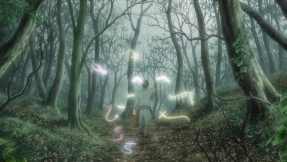
In terms of how well the show explores its concept of mushi and their roles in the world, it is highly versatile. At first, viewers may come to view mushi as nothing more than trouble-making entities that need to be eliminated, particularly because so many people come to be victims of their influence. However, the show goes on to prove that in addition to providing the life force for all living things, and providing other benefits to people as well, the problems mushi may at times create are inadvertent, for they are the same as any other living being: trying to survive the only way they know they can.
Perhaps the line that best captures the show’s perspective of mushi is when Ginko says, “Don’t let yourself be blinded by fear or anger. Everything is only as it is.” This line is particularly significant because even though it is directed towards the villagers’ usually quick-to-kill behavior against mushi, the concept of mushi itself can be representative of all things that are unknown or strange to people—things which we often react to with bias, hatred, and ignorance. If we are to view the show from this perspective, the entire show can be understood as an allegory for our general treatment towards the unfamiliar. Whether or not this is what is intended, the presentation of mushi and their relationship to humanity accurately depicts life as not so simplistic as we may wish it to be, but in fact often complicated by multiple factors that may or may not be beyond our control.
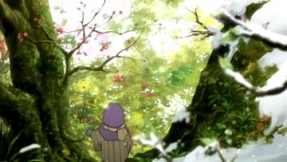
Aside from some of the brilliant things the show does with its presentation of humanity’s relationship to mushi, the show has just a couple of episodes where it opts for mysteriousness rather than a complex story. By this I mean that in these episodes, focus is given to the effects of a particular mushi and figuring out its identity rather than placing emphasis on how the mushi’s relationship is viewed by and impacts society. At times, the situations seem tailored to what some people may find personally intriguing (for example, seeing a patch of nature as it would appear in the springtime while the surrounding area is a cold winter landscape), but the issue with this is that it inevitably leaves a certain part of the audience disinterested, particularly since up until these moments, many episodes have been focusing on a variety of elements dealing with mushi rather than just on the single aspect of having an “air of mystery.” Some people may find this to be a refreshing change of pace, while others may point to it as a flaw; as it is difficult to achieve an objective consensus on this, I will leave viewers of the show to decide for themselves.
Another aspect of the show that may deter certain viewers is the pacing. The first season has 26 episodes, and if viewers go in with the understanding that each one is packed with material solely devoted to telling a single, complex story with a consistently brooding—though occasionally lighter—tone, then the gradual presentation of a story may not be much of an issue. But for those who prefer fast-paced stories with bigger overarching arcs, the slow pacing and episodic nature may be a big turn-off. In general, if you are fan of the short story genre, or well-crafted realistic fantasy tales, then Mushishi is a must-watch.
Characters and their Development
The only character in the first season that has a recurring role is Ginko—an enigmatic, traveling mushishi (a person whose profession is to deal with mushi who are causing trouble for people) who cares a great deal about helping both people and mushi without having to resort to killing the latter in order to solve the problems that arise. And while the show does delve a little into Ginko’s past, he still may come across as a mysterious character. Part of the reason for this is because the show focuses primarily on shaping the lives and back-stories of the villagers he comes to aid, their relationships to the mushi they are afflicted by, and how Ginko goes about figuring out what kind of mushi they are and how to deal with them instead of portraying every aspect of Ginko’s personality to the viewer.
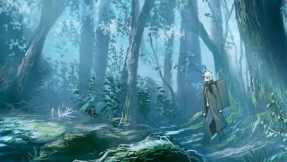
However, because the story’s structure and Ginko’s circumstances require his constant moving-about, it may explain why it is so difficult to learn more about Ginko. As a character who cannot remember anything about his life prior to the age of 10, who is forced to keep moving because mushi are attracted to him, and who is always trying to learn about others’ lives, it actually is not that surprising that viewers learn so little about him. As a result, from the viewers’ perspective, Ginko may come to resemble more of a device that propels the story forward rather than a unique character with his own voice. Fortunately, the show adds occasional moments here and there during his interactions with people and mushi to indicate that there is a unique voice underneath. So despite how mysterious and different he is from everyone else around him, not only from his physical appearance but his way of thinking as well, Ginko ultimately comes across as someone who refuses to be a burden to anyone, who sympathizes with the struggles of others, and who, more than anything, wishes for all animals, humans, plants, and mushi to live in continuous harmony.
The rest of the show is filled with villagers or the occasional mushishi other than Ginko, but as mentioned before, almost none of them ever appear more than once, and some of them (particularly other mushishi) may appear for only a few seconds. Within each short story, however, a lot of attention is given to who a particular villager is in relation to the mushi being investigated and how their life was prior and after to being affected by the mushi. This is the primary reason why the pacing is generally slow as each episode is completely devoted to shaping the villager and mushi in question. The decisions and feelings of certain characters at times significantly complicate the situation, while at other moments, the circumstances characters find themselves in make that impossible. Ultimately, however, it is refreshing to see that the characters do not always follow every single thing Ginko advises them to do, which keeps each episode from becoming formulaic or predictable. And with each episode being as imaginative and—usually—complex as the one before it, the show manages to create an in-depth and satisfying experience with each tale.
Aesthetics and Conclusion
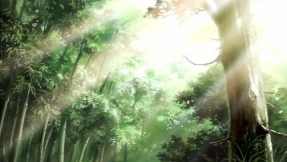
In terms of the overall look and feel of the show, it generally has a very “relaxed” atmosphere—partly as a result of the pacing, the use of warm colors during the warm seasons, and especially the soundtrack. Episodes vary between the vibrant greener colors during the warm seasons, and dark dimmer colors during the colder ones. And as a show that features villages that are deep inland, close to sea, or even situated on islands, all types of weather are represented which keeps the background for each episode from ever growing stale.
The music in the show gives off an “older” vibe—as if the instruments being used are the same ones that were played during the time period in which the show is set. Whenever a character’s back-story is being explained, the music is often calm and contemplative, while moments in the show where there is serious cause for alarm feature fast-paced percussion to heighten the tension of the situation—and since scenes like these are only occasionally employed, the effect on the viewer is practically spell-binding. One downside to consider is that the character designs for the villagers often appear hardly any different from the previous village, so for viewers who prefer everything to be completely different each time, this aspect may be off-putting. However, with stories that are as complex and truly riveting as they are in this show, viewers are guaranteed a solid viewing experience.
For veteran anime watchers: If you are a fan of short stories and a blend of the supernatural with realism, then you will love this show. And with the first half of the second season already aired, 2 specials, and more episodes to come, you will have plenty to watch if you enjoy the first season. For those who are uncertain as to whether or not the genre may appeal to them, give the first episode a shot—if you like it, then you will appreciate the rest of the series, but if not, it may not be the show for you.
For non-anime watchers: I believe Mushishi can definitely be viewed as a “gateway” anime. By this I mean that if you are skeptical about the anime medium, but are a fan of the supernatural genre, then I strongly recommend giving this show a chance—it might just be the thing that gets you into watching and appreciating other anime as well.
Rating:
What do you think? Leave a comment.




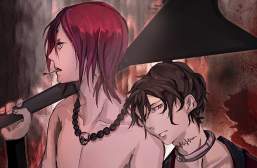
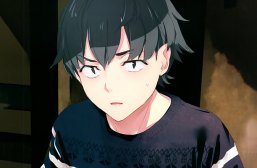


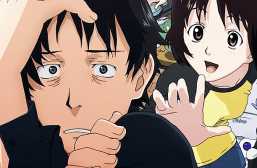
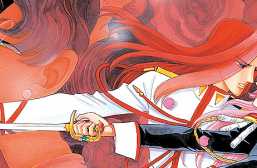
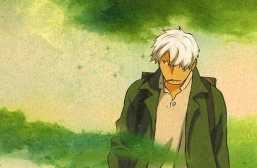
It’s a different Anime, but it lacks character development (a lot), I would give it a 3 at most.
I would have to agree with you on the fact it lacks some character development, I was willing to forgive the anime since everything else was incredible, and since we did get a little bit of it, even if there could have been more.
the story was never intended to have character development. Its more focused on its setting and the plot rather than character development. You most likely know nothing about story telling if you believe that character development is a requirement for excellent story telling
Character development is important, almost paramount.
i couldnt really watch this show. not that it was bad or anything, but it was too slow. when i first started watching it got my attention and i was like “FUCK YEA!” but after awhile it got boring. i might pick it back up in the near future though.
The pacing can be a big turn-off for people, but if you enjoyed it in the beginning, it could just be the general brooding, dark tone of the show that’s keeping you from enjoying it. It’s by no means a “thriller” so if that is what you’re looking for, you might better enjoy shows like Psycho Pass and Steins; Gate. Thanks for the comment!
The only complaint I have, a minor one at that, was the amount of depressing episodes. Brilliant series, though. Probably the best I’ve seen.
Glad to hear you enjoyed it! 🙂
I’ve been reading the manga sand I need up loving this anime/manga
With the slow music and recurring themes of nature and balance, I kind of think of the episodes as anime haiku. Most of them are pretty sad – or rather melancholic – but they always cheer me up in their way.
“Anime haiku” is a really interesting way to put it; I think it can definitely be “spiritually uplifting” despite how dark it is at times. Thanks for the comment!
Ok to put it simple: Mushishi is a piece of art.
Yes; a thousand times yes 🙂
This is in my top five anime and I tried recommending it to my friends but they found it boring. I don’t understand why though lol they just kinda do.
For some people the pacing and general brooding tone of the show can be off-putting. If they prefer watching shows that are much lighter in tone, or are more along the lines in the “thriller” genre, then that could be why they didn’t enjoy it. But I agree; I absolutely love this show. Thanks for the comment!
I absolutely agree with this review. What an amazing experience this was. It is the kind of anime you watch after long day and you feel tired – this kind of anime is very calming and tranquil. Definitely one of my most favourite series ever made.
Thanks so much for the read! 🙂
Mushishi is one of my favorites as well–truly a unique and exceptional anime.
I have got to watch this one. I’ve had Kino’s Journey recommended and I loved it and so this was recommended next. I’m positive I’ll love this one too.
You’ll love it!
It’s definitely worth the watch 🙂
Mushishi is a masterpiece, really great series!
agreed 😀
Mushi-Shi is an anime, yes, but also an experience.
It isn’t for everyone, and you know what? That’s what I love about it. There’s just, no other show like it, in the anime world. It’s best to watch it later on at night, when you’re not quite exhausted, but zoned out just enough to let yourself drift, and let this quiet, dignified beauty consume your everything.
Mushi-Shi is a brilliant show. With no over-arching plot and a diminutive amount of main characters, Mushi-Shi is meditative, yet each of its individual stories are as haunting and beautiful as they are oblique and original.
Fanboy on: Maybe some people are looking for the wrong things in this Anime. I love this calm and humble style and think it delivers a lot more on the philosophical aspect. Mushishi is inspirational and i am really thankfull to everyone who was involved in creating this piece of art. :Fanboy off
I loved watching this show last summer, I’ll never forget it. Great review too.
Much appreciated 🙂
The overarching storyline part immediately reminded me of Soul Eater: Amazing anime ruined by such a cliche and stupid ending
I love this anime I got angry when they took it off of Netflix this was one of the best.
I love this show! The music is amazing!!
Yup, there’s nothing else quite like it. Thanks for the comment!
I never did finish watching this show…! It’s a gorgeous little anime, definitely, and at times feels like it isn’t concerned with interesting its viewers – its best asset and its worst. I dunno, the last anime I started watching was Berserk (probably the exact opposite of Mushishi..)…I miss the days of binge watching anime during a lazy May Saturday afternoon.
Thanks for this.
From what I hear, Berserk is most definitely the opposite XD .
And you are most welcome 🙂
I really enjoyed Mushishi, only finished it recently. It definitely is one of the stranger animes I’ve seen, in it’s episodic approach. In the end I sort of explain it as like Supernatural the anime.
This is one of the better animes of the past 10 years for sure. You will love it.
I think you’ve managed to capture the most important (and beautiful) aspects of this show, with a couple of exceptions. Firstly, you don’t mention (as a few other comments have) just how dispiriting some of the endings can be, which I thought made the show seem much more realistic. Secondly, while very few elements were carried over between episodes – the story of Ginko’s eye, the artefact buying doctor, the the occasional passing reference to previous events – these made the show feel like each story was a detailed look at a part of Ginko’s life, a look so thorough that it often excluded him, rather than a series of events connected only by one character. This is a great review that really does justice to an exceptional show.
Mushishi is one of the greatest anime series ever made; I was pleasantly surprised when I heard that they were making a second season almost a decade after the first season ended. I was not expecting such a thing to happen. Of course, it lived up to expectations. Looking forward to the second half of Zoku Shou.
This show is great bcoz its subtle yet deep. Hardly we can find some serious anime which doesn’t require well endowed figures, weakling males thats always surrounded by a harem and such.
While Psycho Pass is rather serious as well, I would say Moribito as being the closest. Totally nonsense free.
Most find Mushishi too slow but if they were to watch the live action first, it’ll be a good introducer to this series.
This is a well-written article that fleshes out what the show is about. I love how it is put as a “gateway” to anime. This is exactly how I graduated to more mature story-oriented shows. It is definitely one that I would recommend to anyone interested in anime.
I loved the anime, and your review truly does it justice. Thanks for supporting such a great show!
I love this show, it’s an experiment in Zen more than anything resembling a traditional narrative. It doesn’t moralize and there isn’t always a solution to the problem; it’s a collection of subtle, understated glimpses into human nature. The painted still backgrounds and long stretches without dialogue almost allow the viewer to slip into a meditative trance. Perfect show to enjoy on any kind of mind-altering substances or just a hot cup of tea and fall asleep to.
I enjoyed the anime’s episodic story telling. It gave the show a smooth, ocean wave-like tone, and was a nice break from the drawn-out narratives that are popular today.
I LOVE this show! It is so mellow and calming.
This was definitely one of my favourite animes. What sticks out most to me is not only is a paranormal themed series, it has that nice flavor of mystery and Ginko as an astute detective. As a veteran anime viewer, you’re very right, it was right up my alley.
I’ve always had trouble explaining this show to my friends, despite loving it for myself. Your review is a good gateway for me to do just that!
I’m curious what you thought of the strange, recurring River of Light idea, since that is never heavily explored, but seems to be a constant point of reverence for the characters that know about it. Is it a religious symbol, or some sort of metaphor for the power that knowledge imparts?
Thanks for your article!
My boyfriend and his brothers love this anime, and he made me watch most of season 1 with him. But I just couldn’t get into it. I admire the plot lines, the music, and the aesthetics, but this anime is just too episodic. There’s no drive, no urge to keep watching the next episode. Also, it lacks character development.
This is definitely an episodic series which is a total classic. The music was just so good that it gave me goosebumps every time. Guys, It’s an anime which has a totally different vibe. If you don’t like slow paced anime which features story-telling, then you can surely drop it.
I have to agree with everything the author says. Mushi-shi is one of my all-time favourite anime. It’s calm aesthetic and great music track always put me in a good mood, so it’s my go-to show whenever I need some stress relief! Moreover, I never get bored watching it again and again. The second season was as great as the first one, and even had some of the minor characters from the first season come back. Can’t wait to see the movie!
Mushi-shi’s atmosphere is definitely one of the show’s stronger points. Amidst high action and high energy animes, it’s nice to see a show with calmer dynamic accompanied by shorter, yet fulfilling plots. The art style and character design really sets it apart from other animes. It almost feels like a series of paintings combined with soothing music. I admit it’s a bit slow, however, it doesn’t bother me. In the end, it’s all a matter of taste.
I really enjoyed this show, and I hadn’t really considered the short story structure until now. As someone who loves short stories, I’m always excited to see pieces that are not considered an “easy sell” really succeed, so I’m glad the series has done as well as it has.
Mushi-Shi is an anime with a calm pace. It doesn’t focus on a specific conflict, but the problems between Mushi and Humans. For watchers that like fast pace and action filled anime, Mushi-Shi might be too boring for you.
But for those who want something calm and soothing to watch, I recommend you this anime.
After reading some comments on how people found the pacing was slow and boring I am reminded of the story of the living god (the one with the flowers that age a person in a day) where the main girl says she feels like her normal human life feels painfully slow and agonizing…
Anyways… I don’t know why but I love this anime! I feel at peace when the vein of light flows under the ground, and unsettled when things feel like they’re going against nature’s order…
Also thank you for the review 🙂